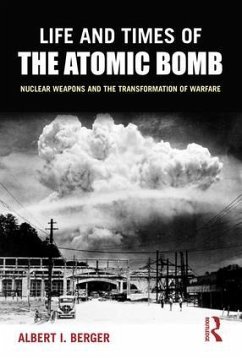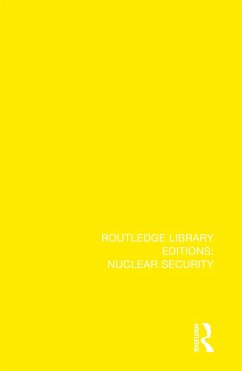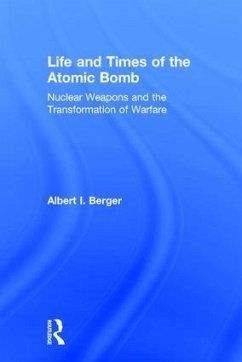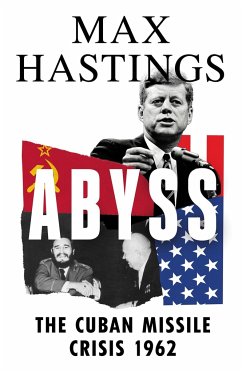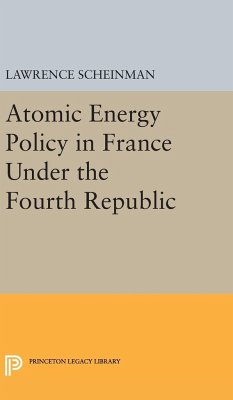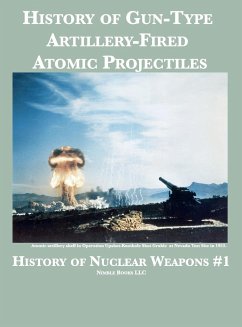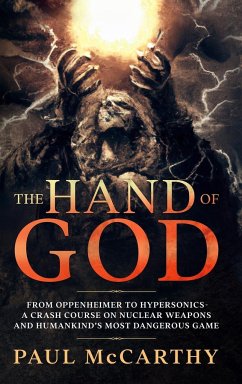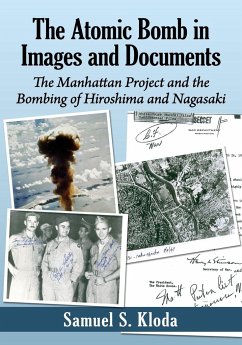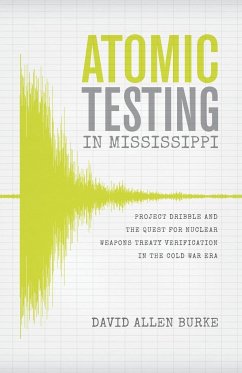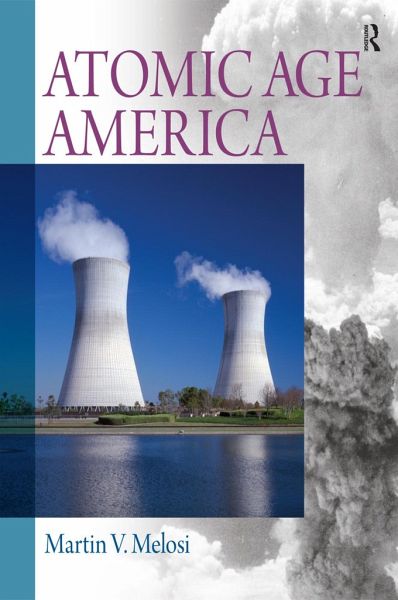
Atomic Age America
Versandkostenfrei!
Versandfertig in 1-2 Wochen
94,99 €
inkl. MwSt.

PAYBACK Punkte
47 °P sammeln!
For courses in 20th-century America, the Cold War, 1945 to the present, and history of science.
Examines nuclear science as a lens into 20th-century America.
Atomic Age America looks at the broad influence of atomic energy - a transformative technology - especially on the lives of Americans within a world context. The text examines the social, political, environmental and scientific consequences of atomic energy on the 20th and 21st centuries, with a look back to the origins of atomic theory.
Product Description
Examines atomic energy as a lens to 20th and 21st-century America.
Atomic Age America looks at the broad influence of atomic energy-focusing particularly on nuclear weapons and nuclear power-on the lives of Americans within a world context. The text examines the social, political, diplomatic, environmental, and technical impacts of atomic energy on the 20th and 21st centuries, with a look back to the origins of atomic theory.
Learning Goals
Upon completing this book readers will be able to:
Develop a background in the origins of atomic theory and atomic science
View nuclear technologies within the historical context in which they were created and used
Understand how atomic energy helped frame the second half of the 20th century, and how it continues to influence in the 21st
Note: MySearchLab does not come automatically packaged with this text. To purchase MySearchLab, please visit: www.mysearchlab.com or you can purchase a ValuePack of the text + MySearchLab (at no additional cost): ValuePack ISBN-10: 0205819133 / ValuePack ISBN-13: 9780205819133.
Features + Benefits
This unique texttakes a fresh look at the origins of atomic theory as a basis for understanding our world.
The narrative connects the history of atomic energy with other key historical issues, such as:
The relationship between science and government
How the atomic bomb changed ideas about warfare
The role of the bomb in the Cold War
The relationship between atomic energy and terrorism
The textdiscusses the following topics so students will understand atomic energy and risk:
Three Mile Island
Chernobyl
Fukushima
Atomic Age America places the American experience in a world context for comparative purposes.
A Test Bank and PowerPoint Presentations are available for instructors to use in their courses.
MySearchLab Connections: Sources Online sections at the end of each chapter provide a list of primary source documents available on the MySearchLab Web site that relate to the content within each chapter.
MySearchLab with eText can be packaged with this text.
MySearchLab provides engaging experiences that personalize learning, and comes from a trusted partner with educational expertise and a deep commitment to helping students and instructors achieve their goals.
eText - Just like the printed text, you can highlight and add notes to the eText or download it to your iPad.
Assessment - Chapter quizzes and flashcards offer immediate feedback and report directly to the gradebook.
Writing and Research - A wide range of writing, grammar and research tools and access to a variety of academic journals, census data, Associated Press newsfeeds, and discipline-specific readings help you hone your writing and research skills.
Pearson SourceCheck - This feature offers an easy way to detect accidental plagiarism issues, and our exclusive tutorials teach how to avoid them in the future.
AutoCite - AutoCite helps to correctly cite sources in a variety of formats.
Class Preparation Tool - Our Class Preparation Tool collects the best class presentation resources in one convenient online destination. Resources include PowerPoint slides, streaming audio and video, audio clips for class tests and quizzes, and all illustrations for creating interactive lectures.
Create a Custom Text: For enrollments of at least 25, create your own textbook by combining chapters from best-selling Pearson textbooks and/or reading selections in the sequence you want. To begin building your custom text, visit www.pearsoncustomlibrary.com. You may also work with a dedicated Pearson Custom editor to create your ideal text-publishing your own original content or mixing and matching Pearson content. Contact your Pearson Publisher's Representative to get started.
Introduction: A Most Controversial Technology
Chapter 1 A Community of Scientists: Atomic Theory over the Centuries
Chapter 2 Government Mobilizes the Atom: War, Big Science, and the Manhattan Project
Chapter 3 Hiroshima, Nagasaki, and the Aftermath: From Total War to Cold War
Chapter 4 The Cold War and Atomic Diplomacy: Deterrence, Espionage, and the Super
Chapter 5 Invincible to Vulnerable in the Age of Anxiety: Massive Retaliation, Fallout, and the Sputnik Crisis
Chapter 6 To the Brink: The Military-Industrial Complex, the Berlin and Cuban Crises, and the Lingering Arms Race
Chapter 7 Too Cheap to Meter, Too Tempting to Ignore: Peaceful Uses of the Atom
Chapter 8 Nuclear Power v. The Environment: The Bandwagon Market, Reactor Safety, and the Energy Crisis
Chapter 9 The Post-TMI World, Chernobyl, and the Future of Nuclear Power
Chapter 10 Pax Atomica-or Pox Atomica--at the End of the Cold War
Chapter 11 Proliferation, Terrorism, and Climate Change: The Atom in the 21st Century
Conclusion: From Hiroshima to Fukushima
Examines nuclear science as a lens into 20th-century America.
Atomic Age America looks at the broad influence of atomic energy - a transformative technology - especially on the lives of Americans within a world context. The text examines the social, political, environmental and scientific consequences of atomic energy on the 20th and 21st centuries, with a look back to the origins of atomic theory.
Product Description
Examines atomic energy as a lens to 20th and 21st-century America.
Atomic Age America looks at the broad influence of atomic energy-focusing particularly on nuclear weapons and nuclear power-on the lives of Americans within a world context. The text examines the social, political, diplomatic, environmental, and technical impacts of atomic energy on the 20th and 21st centuries, with a look back to the origins of atomic theory.
Learning Goals
Upon completing this book readers will be able to:
Develop a background in the origins of atomic theory and atomic science
View nuclear technologies within the historical context in which they were created and used
Understand how atomic energy helped frame the second half of the 20th century, and how it continues to influence in the 21st
Note: MySearchLab does not come automatically packaged with this text. To purchase MySearchLab, please visit: www.mysearchlab.com or you can purchase a ValuePack of the text + MySearchLab (at no additional cost): ValuePack ISBN-10: 0205819133 / ValuePack ISBN-13: 9780205819133.
Features + Benefits
This unique texttakes a fresh look at the origins of atomic theory as a basis for understanding our world.
The narrative connects the history of atomic energy with other key historical issues, such as:
The relationship between science and government
How the atomic bomb changed ideas about warfare
The role of the bomb in the Cold War
The relationship between atomic energy and terrorism
The textdiscusses the following topics so students will understand atomic energy and risk:
Three Mile Island
Chernobyl
Fukushima
Atomic Age America places the American experience in a world context for comparative purposes.
A Test Bank and PowerPoint Presentations are available for instructors to use in their courses.
MySearchLab Connections: Sources Online sections at the end of each chapter provide a list of primary source documents available on the MySearchLab Web site that relate to the content within each chapter.
MySearchLab with eText can be packaged with this text.
MySearchLab provides engaging experiences that personalize learning, and comes from a trusted partner with educational expertise and a deep commitment to helping students and instructors achieve their goals.
eText - Just like the printed text, you can highlight and add notes to the eText or download it to your iPad.
Assessment - Chapter quizzes and flashcards offer immediate feedback and report directly to the gradebook.
Writing and Research - A wide range of writing, grammar and research tools and access to a variety of academic journals, census data, Associated Press newsfeeds, and discipline-specific readings help you hone your writing and research skills.
Pearson SourceCheck - This feature offers an easy way to detect accidental plagiarism issues, and our exclusive tutorials teach how to avoid them in the future.
AutoCite - AutoCite helps to correctly cite sources in a variety of formats.
Class Preparation Tool - Our Class Preparation Tool collects the best class presentation resources in one convenient online destination. Resources include PowerPoint slides, streaming audio and video, audio clips for class tests and quizzes, and all illustrations for creating interactive lectures.
Create a Custom Text: For enrollments of at least 25, create your own textbook by combining chapters from best-selling Pearson textbooks and/or reading selections in the sequence you want. To begin building your custom text, visit www.pearsoncustomlibrary.com. You may also work with a dedicated Pearson Custom editor to create your ideal text-publishing your own original content or mixing and matching Pearson content. Contact your Pearson Publisher's Representative to get started.
Introduction: A Most Controversial Technology
Chapter 1 A Community of Scientists: Atomic Theory over the Centuries
Chapter 2 Government Mobilizes the Atom: War, Big Science, and the Manhattan Project
Chapter 3 Hiroshima, Nagasaki, and the Aftermath: From Total War to Cold War
Chapter 4 The Cold War and Atomic Diplomacy: Deterrence, Espionage, and the Super
Chapter 5 Invincible to Vulnerable in the Age of Anxiety: Massive Retaliation, Fallout, and the Sputnik Crisis
Chapter 6 To the Brink: The Military-Industrial Complex, the Berlin and Cuban Crises, and the Lingering Arms Race
Chapter 7 Too Cheap to Meter, Too Tempting to Ignore: Peaceful Uses of the Atom
Chapter 8 Nuclear Power v. The Environment: The Bandwagon Market, Reactor Safety, and the Energy Crisis
Chapter 9 The Post-TMI World, Chernobyl, and the Future of Nuclear Power
Chapter 10 Pax Atomica-or Pox Atomica--at the End of the Cold War
Chapter 11 Proliferation, Terrorism, and Climate Change: The Atom in the 21st Century
Conclusion: From Hiroshima to Fukushima
Atomic Age America looks at the broad influence of atomic energy, focusing particularly on nuclear weapons and nuclear power on the lives of Americans within a world context.





